人教版七年级下册Unit 12 What did you do last weekend? Section A Grammar Focus~3c课件(共23张PPT)
文档属性
| 名称 | 人教版七年级下册Unit 12 What did you do last weekend? Section A Grammar Focus~3c课件(共23张PPT) | 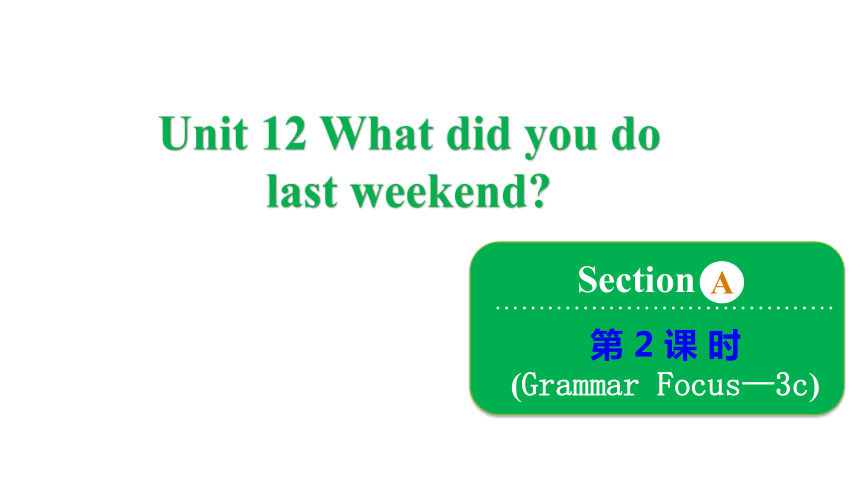 | |
| 格式 | pptx | ||
| 文件大小 | 1.7MB | ||
| 资源类型 | 教案 | ||
| 版本资源 | 人教新目标(Go for it)版 | ||
| 科目 | 英语 | ||
| 更新时间 | 2024-05-02 22:00:10 | ||
图片预览

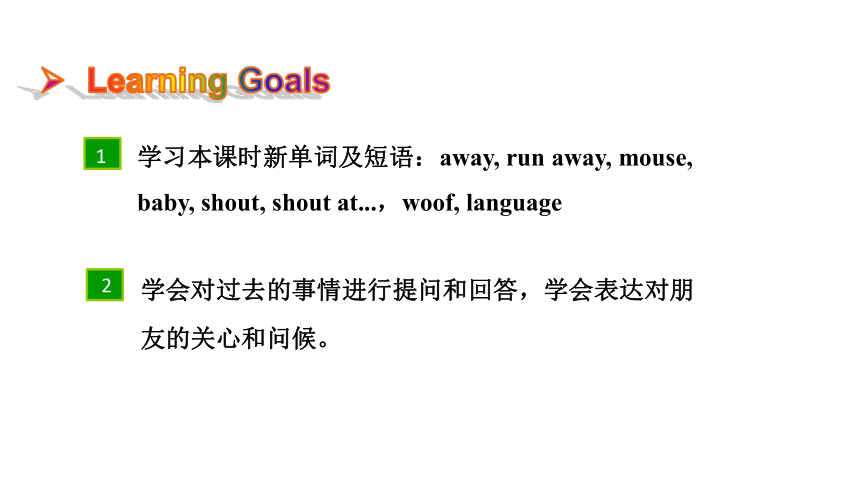
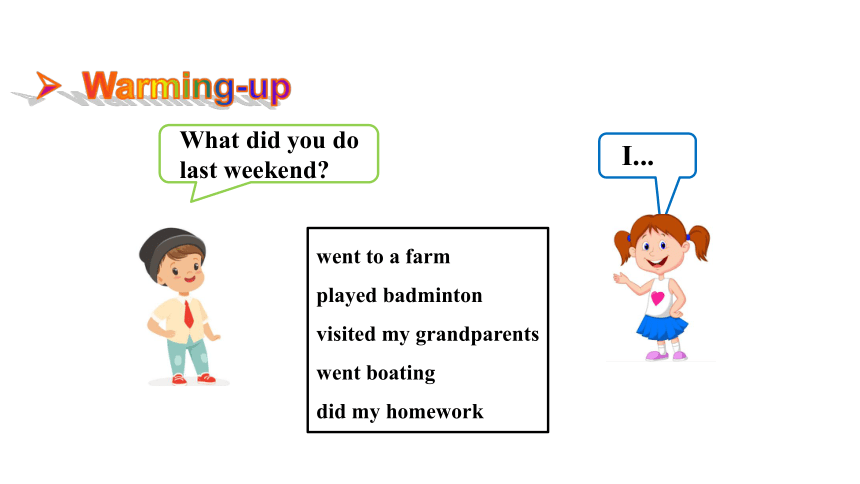
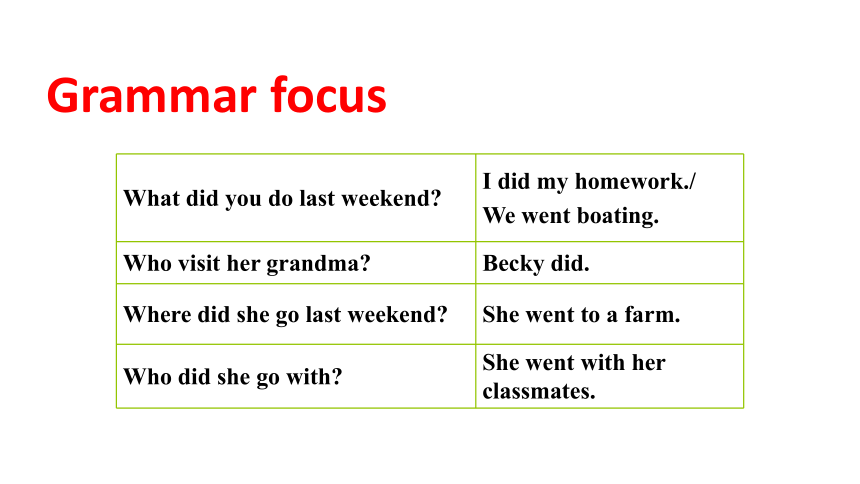



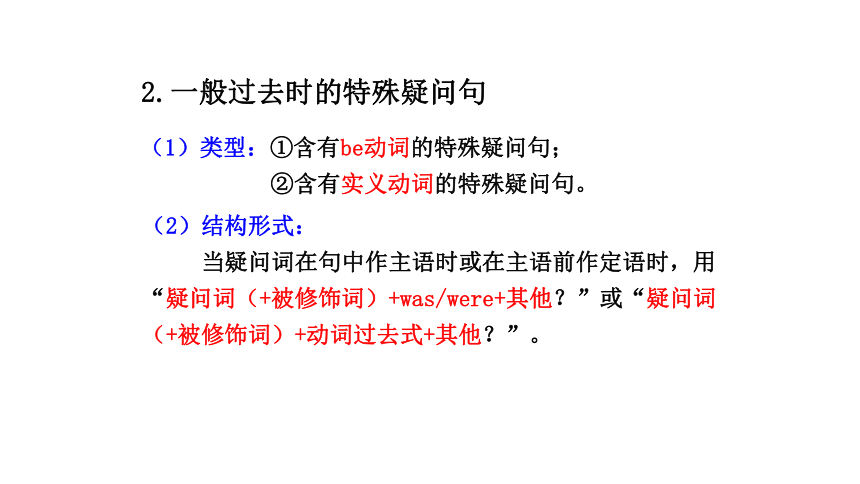
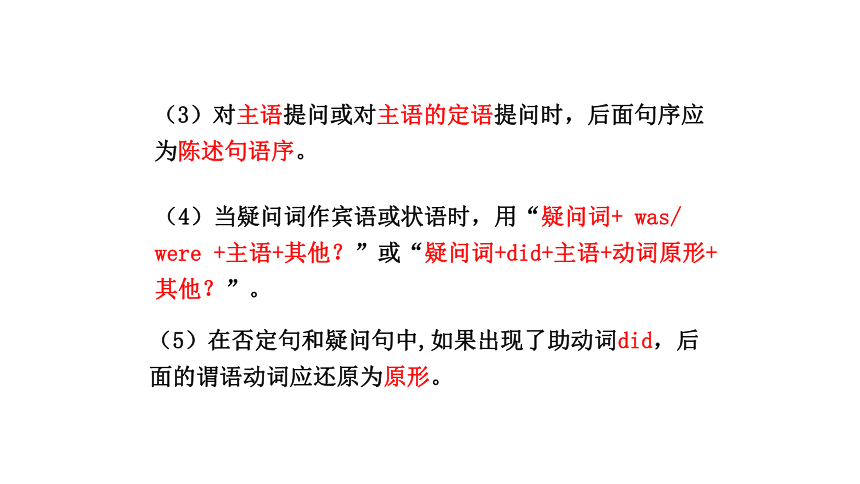
文档简介
(共23张PPT)
Section
第 2 课 时
(Grammar Focus—3c)
…………………………………
A
Unit 12 What did you do last weekend
学习本课时新单词及短语:away, run away, mouse, baby, shout, shout at...,woof, language
1
学会对过去的事情进行提问和回答,学会表达对朋友的关心和问候。
2
Learning Goals
What did you do last weekend
went to a farm
played badminton
visited my grandparents
went boating
did my homework
Warming-up
I...
What did you do last weekend I did my homework./
We went boating.
Who visit her grandma Becky did.
Where did she go last weekend She went to a farm.
Who did she go with She went with her classmates.
Grammar focus
1.一般过去时的用法
(1)表示说话前所发生的动作。
一般过去时
He told us to pick apples. 他让我们摘苹果。
Language points
(2)表示过去所发生的一系列动作。
After school I hurried to ride my bike, got off the bike, put down my bag and went into the house.
放学后,我骑自行车赶回家,下车,放下我的书包,然后就进屋了。
(3)讲述(过去的)故事或表示已故的人所
做的事情。
Comrade Lei Feng did good deeds in his life.
雷锋同志在他的生命中总是做好事。
2.一般过去时的特殊疑问句
(1)类型:①含有be动词的特殊疑问句;
②含有实义动词的特殊疑问句。
(2)结构形式:
当疑问词在句中作主语时或在主语前作定语时,用 “疑问词(+被修饰词)+was/were+其他?”或“疑问词(+被修饰词)+动词过去式+其他?”。
(3)对主语提问或对主语的定语提问时,后面句序应为陈述句语序。
(4)当疑问词作宾语或状语时,用“疑问词+ was/ were +主语+其他?”或“疑问词+did+主语+动词原形+其他?”。
(5)在否定句和疑问句中,如果出现了助动词did,后面的谓语动词应还原为原形。
如:
(1)yesterday,yesterday morning/afternoon/ evening;
last weekend /year/week/month; in 1992; two weeks
ago.
3.一般过去时的时间状语
(2)有时与连词when、after、before、until等引导的
表示过去的时间状语连用。
Fill in the blanks with who, what, when, where or how.
A: ______ did you do last weekend
B: I played badminton on Saturday.
A: Sounds fun! _______ did you play with
B: I played with my father. He’s really good!
What
Who
3a
2. A: _______ was your weekend
B: It was great! I had so much fun!
A: ________ did you go
B: The weather was beautiful, so I went to the beach with my parents.
How
Where
3. A: ______ did Jim lose
B: He lost his keys. He often loses things.
A: That’s too bad. ______ did he lose them
B: I heard it was yesterday.
What
When
Complete the passage with the correct forms of the words in the box.
say be climb see run away
A family of mice were in the kitchen on Saturday morning when they ________ a big cat. Baby Mouse ________ afraid and ________ onto his father’s back.
saw
was
climbed
3b
Father Mouse shouted at the cat, “Woof, woof! ” The cat quickly _________. “Wow, Dad, you’re good!” ______ Baby Mouse. “Well, son, that’s why it’s important to learn a second language,” answered Father Mouse.
ran away
said
1. mouse 意为“老鼠”,复数形式为“mice”。
They saw two mice. 他们看到了两只老鼠。
2. shout at “冲......大声叫嚷”,后面要跟人或事物。
Don’t shout at the children. 不要朝孩子们大声喊叫。
3. language 意为“语言”,是可数名词。
English, Chinese and French are three different languages.
英语、汉语、法语是三种不同的语言。
Language points
Think of two things you did last weekend. Draw pictures of them. Your classmates guess what you did.
3c
What did I do
You went boating.
You are right.
What did I do
You fed chickens.
You are right.
1. I got up at eight yesterday.
______ ____ you get up yesterday
2. We went boating last weekend.
_____ ____ you ___ last weekend
What did do
When did
一、对句子画线部分提问。
Exercises
3. They were at home last Sunday.
_______ _____ they last Sunday
4. My last weekend was kind of boring.
_____ _____ your last weekend
Lily took a walk with her grandparents after dinner.
_____ ____ Lily take a walk with after dinner
How was
Where were
Who did
1. Tom borrowed a bike yesterday.(改为否定句) _______________________________
2. He was ill last Sunday.(改为一般疑问句,并作否定问答)
______________________
______________________
3. We did our homework last night.(改为一般疑问句,
并作肯定问答)
_________________________________
_________________________________
Tom didn’t borrow a bike yesterday.
Was he ill last Sunday
Did you do your homework last night
No, he wasn’t.
二、句型转换。
Yes, we did.
Homework
1. Remember the sentences in Grammar Focus.
2. Think of five interesting things you did last month. Then write them down in English.
Section
第 2 课 时
(Grammar Focus—3c)
…………………………………
A
Unit 12 What did you do last weekend
学习本课时新单词及短语:away, run away, mouse, baby, shout, shout at...,woof, language
1
学会对过去的事情进行提问和回答,学会表达对朋友的关心和问候。
2
Learning Goals
What did you do last weekend
went to a farm
played badminton
visited my grandparents
went boating
did my homework
Warming-up
I...
What did you do last weekend I did my homework./
We went boating.
Who visit her grandma Becky did.
Where did she go last weekend She went to a farm.
Who did she go with She went with her classmates.
Grammar focus
1.一般过去时的用法
(1)表示说话前所发生的动作。
一般过去时
He told us to pick apples. 他让我们摘苹果。
Language points
(2)表示过去所发生的一系列动作。
After school I hurried to ride my bike, got off the bike, put down my bag and went into the house.
放学后,我骑自行车赶回家,下车,放下我的书包,然后就进屋了。
(3)讲述(过去的)故事或表示已故的人所
做的事情。
Comrade Lei Feng did good deeds in his life.
雷锋同志在他的生命中总是做好事。
2.一般过去时的特殊疑问句
(1)类型:①含有be动词的特殊疑问句;
②含有实义动词的特殊疑问句。
(2)结构形式:
当疑问词在句中作主语时或在主语前作定语时,用 “疑问词(+被修饰词)+was/were+其他?”或“疑问词(+被修饰词)+动词过去式+其他?”。
(3)对主语提问或对主语的定语提问时,后面句序应为陈述句语序。
(4)当疑问词作宾语或状语时,用“疑问词+ was/ were +主语+其他?”或“疑问词+did+主语+动词原形+其他?”。
(5)在否定句和疑问句中,如果出现了助动词did,后面的谓语动词应还原为原形。
如:
(1)yesterday,yesterday morning/afternoon/ evening;
last weekend /year/week/month; in 1992; two weeks
ago.
3.一般过去时的时间状语
(2)有时与连词when、after、before、until等引导的
表示过去的时间状语连用。
Fill in the blanks with who, what, when, where or how.
A: ______ did you do last weekend
B: I played badminton on Saturday.
A: Sounds fun! _______ did you play with
B: I played with my father. He’s really good!
What
Who
3a
2. A: _______ was your weekend
B: It was great! I had so much fun!
A: ________ did you go
B: The weather was beautiful, so I went to the beach with my parents.
How
Where
3. A: ______ did Jim lose
B: He lost his keys. He often loses things.
A: That’s too bad. ______ did he lose them
B: I heard it was yesterday.
What
When
Complete the passage with the correct forms of the words in the box.
say be climb see run away
A family of mice were in the kitchen on Saturday morning when they ________ a big cat. Baby Mouse ________ afraid and ________ onto his father’s back.
saw
was
climbed
3b
Father Mouse shouted at the cat, “Woof, woof! ” The cat quickly _________. “Wow, Dad, you’re good!” ______ Baby Mouse. “Well, son, that’s why it’s important to learn a second language,” answered Father Mouse.
ran away
said
1. mouse 意为“老鼠”,复数形式为“mice”。
They saw two mice. 他们看到了两只老鼠。
2. shout at “冲......大声叫嚷”,后面要跟人或事物。
Don’t shout at the children. 不要朝孩子们大声喊叫。
3. language 意为“语言”,是可数名词。
English, Chinese and French are three different languages.
英语、汉语、法语是三种不同的语言。
Language points
Think of two things you did last weekend. Draw pictures of them. Your classmates guess what you did.
3c
What did I do
You went boating.
You are right.
What did I do
You fed chickens.
You are right.
1. I got up at eight yesterday.
______ ____ you get up yesterday
2. We went boating last weekend.
_____ ____ you ___ last weekend
What did do
When did
一、对句子画线部分提问。
Exercises
3. They were at home last Sunday.
_______ _____ they last Sunday
4. My last weekend was kind of boring.
_____ _____ your last weekend
Lily took a walk with her grandparents after dinner.
_____ ____ Lily take a walk with after dinner
How was
Where were
Who did
1. Tom borrowed a bike yesterday.(改为否定句) _______________________________
2. He was ill last Sunday.(改为一般疑问句,并作否定问答)
______________________
______________________
3. We did our homework last night.(改为一般疑问句,
并作肯定问答)
_________________________________
_________________________________
Tom didn’t borrow a bike yesterday.
Was he ill last Sunday
Did you do your homework last night
No, he wasn’t.
二、句型转换。
Yes, we did.
Homework
1. Remember the sentences in Grammar Focus.
2. Think of five interesting things you did last month. Then write them down in English.
同课章节目录
- Unit 1 Can you play the guitar?
- Section A
- Section B
- Unit 2 What time do you go to school?
- Section A
- Section B
- Unit 3 How do you get to school?
- Section A
- Section B
- Unit 4 Don't eat in class.
- Section A
- Section B
- Unit 5 Why do you like pandas?
- Section A
- Section B
- Unit 6 I'm watching TV.
- Section A
- Section B
- Review of Units 1-6
- Unit 7 It's raining!
- Section A
- Section B
- Unit 8 Is there a post office near here?
- Section A
- Section B
- Unit 9 What does he look like?
- Section A
- Section B
- Unit 10 I'd like some noodles.
- Section A
- Section B
- Unit 11 How was your school trip?
- Section A
- Section B
- Unit 12 What did you do last weekend?
- Section A
- Section B
